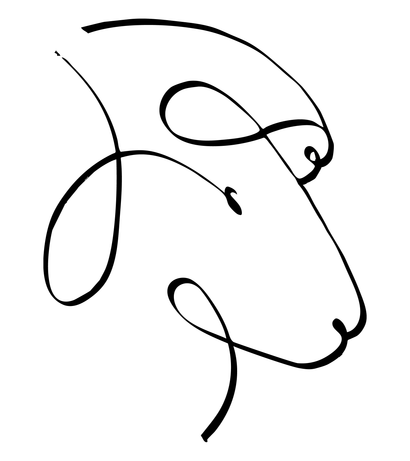Free shipping on all domestic orders over $150
Free shipping on all domestic orders over $150

Your Cart is Empty
Add description, images, menus and links to your mega menu
A column with no settings can be used as a spacer
Link to your collections, sales and even external links
Add up to five columns
Add description, images, menus and links to your mega menu
A column with no settings can be used as a spacer
Link to your collections, sales and even external links
Add up to five columns

February 08, 2021 3 min read 5 Comments
I'm not sure when it happened, but at some point in my knitting career, I stopped having to look at my hands and my stitches while I knit. People who don't knit are impressed by this skill. "You must be an expert," they say, with misplaced awe. At this point, I would have to say, yeah, I'm probably an expert. Not an expert like Ginni, but still. Anyway, I could knit without looking long before would have considered myself an expert. Knitting without looking is like touch typing, as we learned in high school - that's keyboarding for you milennials...It's just a matter of familiarity and practice, nothing more.
But the concept of expert--How do you go from beginning knitter to expert? Is it like getting to Carnegie Hall? Practice, practice, practice. Even getting to Carnegie Hall is more than just practice, so the answer, I think, is yes, and no. Certainly practice is essential, but it's not enough. You can knit a thousand garter stitch scarves and dishcloths or the same top down raglan sweater over and over for 50 years and not be an expert. In my humble opinion, expert knitters are those whose experiences allow them to handle any knitting situation and solve any knitting problem that might come up. They know how to read their knitting. The can look at a piece of fabric and tell you exactly how it was constructed. They can undo lace and cables without a worry, and they can construct garments that fit. They are in control of their knitting, and not the other way around.
So, back to the original question. How do you get there from here? It's about experience. I fell down the knitting rabbit hole head first, and I made it my mission to stretch myself a bit with every project. That tends to be my advice for most beginning knitters. Different stitches are a great way to grow your understanding of the different ways knit and purl combine to create all kinds of fabric. Make it something you have to pay attention to or really figure out. It's very relaxing and comfortable to knit things that are simple and mindless, and I believe you should always have a project on your needles when you want to de-stress; however, if you're looking to really improve your knitting, look for the next project that gives you an appropriate level of challenge and teaches you something new and interesting. That's the first part.
The second part is to knit a wide variety of projects. If you only ever knit washcloths, you may know every stitch under the sun, but you won't understand garment construction, or fabric shaping. If you only ever knit sweaters, you won't understand turning the heel of a sock or creating a crescent-shaped shawl. Both depth and breadth of knitting experience are essential in building knitting expertise.
The third part is some good mentoring to guide and support you as you take on those new and different challenges. It's one thing to look in a book, and even better to watch YouTube, but YouTube can't watch you and say, "Oh, here's the problem." For that, you need a real live expert who can see where you're struggling and teach you the right way.
So there you have it. Just because you can knit with your eyes closed doesn't mean you're an expert, and let me say this too: being an expert is not the goal. The goal is to be confident in your skills, to be in control of the process, and to have a wonderful time doing it. That's the most important part of all.
Warmly,
Ellen
Would love to hear your thoughts in the comments - let me know!
February 09, 2021
Just letting you know the mail is coming through without a hitch!! Your commentary is interesting. Thank you
February 09, 2021
You are right about your points, Ellen. A knit shop is so key to knitting improvements. It’s not just getting your questions answered but listening to others get their questions answered. And sometimes you help each other by just chatting and being encouraged by each other. I feel so sad when a knit shop I have visited closes and I have to find another- you lose that ability to connect a part of yourself- an anchor. I’ve gone through 3 losses. Now I have to travel a distance. Whenever I travel in US or world, knit shops are a community and I always feel anchored again. And the losses are more than just buying yarn or getting help. The owners become friends and the next visit they are closed. I feel an anchor missing in my life. So Ellen, I so appreciate your meeting us on zoom, applaud all your efforts in keeping us anchored both near and far (me). Loved your YouTube with the wool makers. I plan on revisiting that one. I wanted to jump right in with the conversation! Knitters are fun and quirky and such a wide ranging group, it widens us as people. In Germany while visiting one time, I was with my friend who was picking up her child at a rec center. I noticed a group of 5-6 women sitting together in a circle knitting and chatting while waiting for their children. What a happy group…I wanted to join in😀. So treasure your local knit shop and visit others as you travel …well, when that day comes🙏
February 09, 2021
Maybe your problem or illness you can not over
Come at a certain time . Pick up your knitting
Work a few rows and before you know it you
Have calmed down and find yourself relaxed
and at peace. Stay well and mask up please
February 09, 2021
Absolutely always challenge yourself! I never met a mean knitter!!!
Susan
February 16, 2021
Expert knitter? I am so far away from that that I can’t even see it from here, but the journey is fun and rewarding if often frustrating as well.
I would love a Zoom class!
Susan